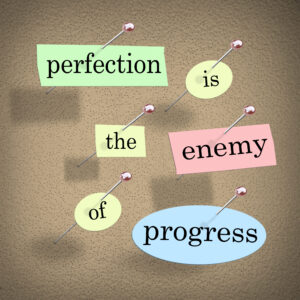Positive Psychology in Divorce – Part 4: The “Good Enough” Agreement
When you’re going through a divorce, it is natural to want everything to go your way. But chasing perfection in the outcome often leads to disappointment, higher costs, and emotional strain. Embracing the concept of a “good enough” agreement can make the process smoother and more manageable.
Over the course of the 30+ years that I’ve practiced family Law, I have seen that clients who aim for a perfect outcome usually end up feeling let down. Perfection isn’t realistic in life, and it certainly isn’t in divorce. Instead, I urge you to consider what a “good enough” outcome looks like for you.
Realize that your ideal parenting arrangement may not be possible

Parents are often not on the same page when they begin discussing their ideal child custody and parenting arrangement, It’s not uncommon to see one parent expecting a 50/50 time-sharing arrangement, while the other expects to be the primary parent and worries about what will happen if the children are not sleeping in that parent’s home most school nights. It’s at this point that we encourage clients to think about what is most important to them about the parenting schedule they want. For the parent who wants a 50/50 arrangement is it solely because of the quantity of time, or is it about the quality of time that arrangement would provide? For the parent who wants the children to live primarily with him or her, what needs of the children are they most concerned about? Could the other parent meet those needs if given the chance? The goal is to find an arrangement that would be “good enough” for both parents while still meeting the children’s best interests.
Have a Realistic View of Your Financial Circumstances
If spousal support is going to be an issue in your divorce, ask yourself how much money you genuinely need each month or how much you can realistically afford to pay. The reality is that there will now be two households to support instead of one. The financial picture may not be pleasant – if you were a stay-at-home spouse, you might hear hard truths like, ”There is not enough income coming in to fully support two households. You’re going to need to return to work.” If you were the higher-earning spouse, you may realize that you may not be able to afford living in your ideal new home because of the support your soon-to-be-ex and children will need. These facts can be tough to accept but it is better to face them head-on than to cling to an unattainable ideal that could leave your ex-spouse or children in a difficult position.
Dangers of Moving the Goalposts
Striving for perfection can also derail negotiations. Even when you both feel comfortable with an agreement, one might suddenly want more or offer less, thinking, “This would be even better if only…” This mindset can destroy the goodwill built up during settlement discussions and make it harder to reach a fair agreement.
Strive for “Good Enough”
To maintain goodwill, you should aim not for a perfect agreement but for one that is “good enough.” Think about the concept of “enough” – just enough good things to sustain you. This doesn’t mean settling for less than you need; it means focusing on what is necessary for a secure and happy post-divorce life.
Ask yourself: What do you need to sustain you? When we ask clients that question, we often hear them talk about things like their desire for financial security, a peaceful home, the ability to create a happy life for themselves and their children, and the ability to move forward. It’s also important to focus on your needs, rather than what you have seen others have received or what you’ve been told you deserve.
Collaborative Divorce and Mediation
Collaborative Divorce and Mediation are excellent pathways to achieve a “good enough” agreement. These methods prioritize open communication and cooperation, helping you and your spouse find solutions that work for both of you. They provide a supportive environment where you can address your needs and create a mutually beneficial agreement without the adversarial nature of traditional court proceedings. Choosing Collaborative Divorce or Mediation can reduce conflict, save time and money, and help preserve a relationship with your ex-spouse, which is especially important if you have children.
Moving Forward
Remember, a “good enough” agreement isn’t about settling; it’s about finding a realistic and sustainable path forward for you and your soon to be ex-spouse. It’s about creating a future where you and your ex can coexist peacefully and support your children’s well-being.
Contact Vacca Family Law Group
If you’re facing a divorce and are curious about how principles of Positive Psychology, such as the “good enough” agreement, can help you move forward constructively, contact us. Our team focuses exclusively on non-adversarial legal solutions, including Collaborative Divorce and Mediation, to help you achieve a fair and amicable outcome. Call us at (646) 798-4603 or contact us online to schedule your free introductory call.
Vacca Family Law Group is located at One Grand Central Place, 60 E. 42nd St., Suite 700, New York, NY 10165.
